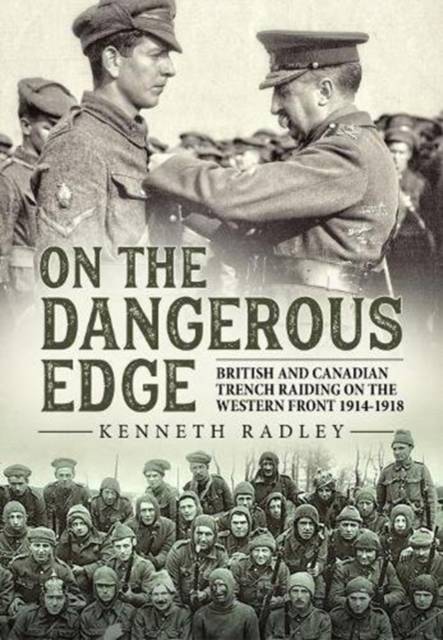
Bedankt voor het vertrouwen het afgelopen jaar! Om jou te bedanken bieden we GRATIS verzending (in België) aan op alles gedurende de hele maand januari.
- Afhalen na 1 uur in een winkel met voorraad
- Gratis thuislevering in België
- Ruim aanbod met 7 miljoen producten
Bedankt voor het vertrouwen het afgelopen jaar! Om jou te bedanken bieden we GRATIS verzending (in België) aan op alles gedurende de hele maand januari.
- Afhalen na 1 uur in een winkel met voorraad
- Gratis thuislevering in België
- Ruim aanbod met 7 miljoen producten
Zoeken
On the Dangerous Edge
British and Canadian Trench Raiding on the Western Front 1914-1918
Kenneth Radley
Paperback | Engels
€ 52,45
+ 104 punten
Omschrijving
This subject appeals not only because it is dramatic and controversial, but also because of the complexity, uncertainty and unpredictability of raiding. Leadership was critical since raiding posed many challenges including vicious hand-to-hand fighting most often at night in unfamiliar trenches. These are just some of the reasons why raids are high in "human interest." The book examines the nature, purposes, mechanics, execution and value of trench raiding. In this it succeeds admirably. It is also unique in three aspects. First, it shares the originality that features so strongly in all of Radley's books. This in itself is appealing given that all too many books today seem to be less original that they are reiterative. While there have been in the past two accounts of raiding, in this latest work originality shines through in Radley's choice and use of sources; in the imaginative use of Kipling's six honest serving men that makes the answers to Kipling's queries stand out sharply; and in the detailed description of preparing raid plans and orders, including their format, content and increasing sophistication. No other book so thoroughly and clearly guides readers from conception to plan and then translation into operation orders and instructions. What is also evident is this soldier-historian's ability, which stems from long-service in the Canadian Army (Regular), and sound military education including Staff College, to apply the tests of military probability, soldierly logic and military common sense to what he has studied. These enable interrogation of misapprehension, nuance and unfounded deductions and conclusions. Second, Radley's approach is unique. At the end of the first eight chapters, which thematically answer Kipling's six queries, readers will be well aware of the nature of planning and executing raids. No other book tackles "How" to raid to the extent this one does. The first half also enables fuller appreciation of the lessons, course and conduct of the selected raids that year by year comprise the last half. Wisely, the author avoided including every raid, a course that almost inevitably would result in indigestible catalogue. Instead, the book offers selected raids, selection based on criteria such as unusual nature, purpose, size or technology, reasons for success or failure, innovation and lessons. Readers are free, of course, to wish this or that raid was present, but the author had also to consider the balance of the book, Canadian and British. Nor is the enemy forgotten. Radley exploits, for example, a Canadian brigadier's primer (the "Book of Wisdom") on preventing and defeating enemy raids. Finally, this book, like all Radley's work, is extremely well documented thanks to a wide range of primary and secondary sources. The Bibliography, at over 40 pages, provides an unprecedented reference guide. Unlike earlier accounts Radley has made extensive use of the contemporary manuals. Remarkably, one earlier account did not even mention SS 107 Notes on Minor Enterprises, but then that account lists only three journal articles and two British divisional histories! For his part, Radley has made unprecedented use of the published histories of 45 British divisions and all the Canadian battalions, each being weighed against the other sources, not only to corroborate, but to enliven the bald official accounts with the color and perspective of officers and men. While these unit and formation histories have serious flaws, and their quality varies, many offer valuable information not available elsewhere. Often these reveal even more in what they do not say. If the reader has appreciable military service so much the better since knowing how an Army works unlocks the nuances and enables amplification. In short, On The Dangerous Edge offers a unique approach and perspective plus thorough and careful assessment and analysis based on broad and deep research in both familiar and in heretofore neglected areas. It is difficult to fault Radley's research and his marshaling of it. This book must surely be the definitive study of raiding. As such, it warrants close attention since it adds much to the history of a neglected aspect of the Great War.
Specificaties
Betrokkenen
- Auteur(s):
- Uitgeverij:
Inhoud
- Aantal bladzijden:
- 548
- Taal:
- Engels
Eigenschappen
- Productcode (EAN):
- 9781912390755
- Verschijningsdatum:
- 26/03/2019
- Uitvoering:
- Paperback
- Formaat:
- Trade paperback (VS)
- Afmetingen:
- 165 mm x 244 mm
- Gewicht:
- 907 g

Alleen bij Standaard Boekhandel
+ 104 punten op je klantenkaart van Standaard Boekhandel
Beoordelingen
We publiceren alleen reviews die voldoen aan de voorwaarden voor reviews. Bekijk onze voorwaarden voor reviews.












